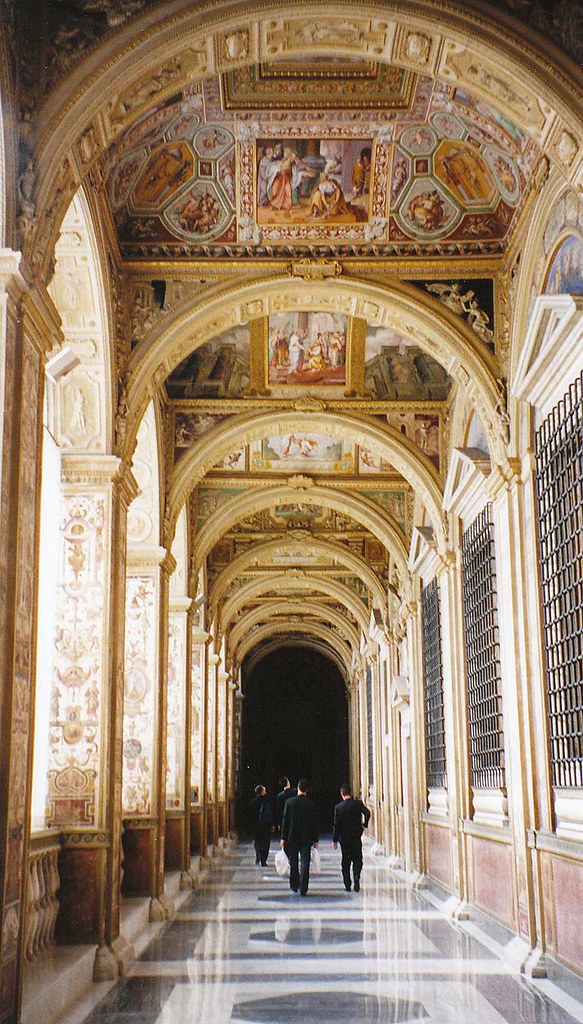The loggia, or colonnaded porch, on the second story of the Apostolic Palace is one of the Vatican’s most remarkable art treasures; its decoration, designed by Raphael (1483—1520) and executed by his workshop in 1517- 1519, epitomizes the spirit of the Italian Renaissance in its synthesis of Christian and classical themes. The thirteen square vaults of Raphael’s loggia each contain four frescoes of scenes from the Bible, from the Creation to the Last Supper. Meanwhile, the plasterwork of the other architectural elements is decorated with "grotesques"—fanciful arabesques enlivened with a wide variety of human and animal figures—modeled after ancient Roman wall paintings. [...] the grotesque ornamental style elaborated by Raphael has been imitated as far afield as the corridors of the United States Capitol, and the Bible scenes served as influential models for popular prints.[1]
The Raphael Loggia consists of numerous vaults, arches and pilasters forming a gallery sixty-five meters long and four meters wide. Its construction was begun by architect and painter Donato Bramante in 1512, under Pope Julius II and was completed by Raphael under the reign of Leo X. Raphael began work on the frescoes in 1517.
Grotesque Motifs
Notes
1. Nicole Dacos, The Loggia of Raphael: A Vatican Art Treasure, Abbeville, 2008.
2. Ibid., p. 43, pl. 19.
3. Photograph by Alan Carroll, 2012 (Surface Fragments and photo-album). Engraving is by Volpato & Ottaviani (after drawings by Camporesi & Savorelli Teseo).
4. Photograph by Alessandro Vasari, c. 1880-90 (Istituto Nazionale della Grafica).
The Raphael Loggia consists of numerous vaults, arches and pilasters forming a gallery sixty-five meters long and four meters wide. Its construction was begun by architect and painter Donato Bramante in 1512, under Pope Julius II and was completed by Raphael under the reign of Leo X. Raphael began work on the frescoes in 1517.
 |
| Raphael Sanzio and Giovanni da Udine Pilaster with Grotesques, fresco, 1515-19 Loggie, Apostolic Palace, Rome Colored engraving by Volpato & Ottaviani, 1772-77 |
Grotesque Motifs
 |
| Raphael and Da Udine Grotesques, 1515-19 Detail from engraving by Volpato & Ottaviani (after drawings by Camporesi & Savorelli Teseo); Le Loggie di Rafaele nel Vaticano, Rome, 1772-77. |
 |
| Half-Figure From a set of gouache colored engravings Le Loggie di Rafaele nel Vaticano, 3 vols., Rome, 1772-77.[3] |
 |
| Raphael and Giovanni da Udine, Grotteschi (Grotesques, candelabrum arrangement), fresco, 1515-19. Pilaster detail. Papal Loggias, Vatican.[4] |
 |
| Fantasy Style Motivos Grutescos |
 |
| Raphael and Giovanni da Udine, Grotteschi (Grotesques, candelabrum arrangement), fresco, 1515. Pilaster detail. Papal Loggias, Vatican |
 |
| Rafael, Grotesque motif, 1515-19 Detail from engraving by Volpato & Ottaviani (after drawings by Camporesi & Savorelli Teseo); Le Loggie di Rafaele nel Vaticano, Rome, 1772-77. |
Notes
1. Nicole Dacos, The Loggia of Raphael: A Vatican Art Treasure, Abbeville, 2008.
2. Ibid., p. 43, pl. 19.
3. Photograph by Alan Carroll, 2012 (Surface Fragments and photo-album). Engraving is by Volpato & Ottaviani (after drawings by Camporesi & Savorelli Teseo).
4. Photograph by Alessandro Vasari, c. 1880-90 (Istituto Nazionale della Grafica).
Photographic records from the original work

Drawings, watercolors, and prints
 |
| Giovanni Volpato et Jean Renard Les logges de Raphaël au Vatican |
 |
| Ermitage |
 |
| Giovanni Volpato Pilaster IV Le Loggie di Rafaele nel Vaticano |
 |
| Giovanni Volpato Le Loggie di Rafaele nel Vaticano |
 |
| Ermitage |
 |
| Ermitage |
 |
| Pierre Adrien Paris Arabesques des loges de Raphaël au Vatican, 1773 Planche XCV Besançon, Bibliothèque municipale, Vol. 482, n° 133 |
 |
| Pierre Adrien Paris Arabesques des loges de Raphaël au Vatican, 1773 Planche XCVI Besançon, Bibliothèque municipale, Vol. 482, n° 134 |
Détails d'arabesques (ou grotesques) des pilastres du décor des Loges de Raphaël au Vatican, 1775. Chaque planche est finement dessinée à l'encre et aquarellée, rassemblant différents motifs des pilastres internes des Loges, peints par Giovanni da Udine. Une feuille d'études d'ornements de la Renaissance qui date du pensionnat de Pâris à l'Académie de France à Rome et l'un des plus beaux dessins aquarellés du fonds de Besançon. Elle a fait partie des 81 planches d'études envoyées fin 1773 ou début 1774, et probablement des dessins que l'architecte a été exceptionnellement invité à présenter devant l'Académie royale d'architecture à Paris au printemps 1775.
 |
| Le Loggie di Rafaelo nel Vaticano 1775-77 Plates designed by P. Camporesi, G. & L. Savorelli Teseo Engraved by G. Volpato & G. Ottaviani Pilasters |
 |
| Decorazione alla Grottesca |
 |
| Tutti Frutti |
 |
| Pilaster XVIII Robert MacPherson (1811-1872). |
 |
| Giovanni da Udine: Grottesche |
Resources
Domus Aurea
Estilo fantasía de la antigua Roma
Sogni dei pittori
Musei Vaticanii





































No comments:
Post a Comment